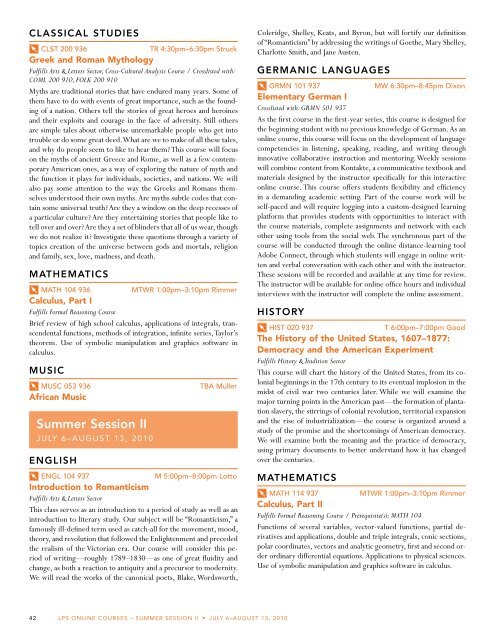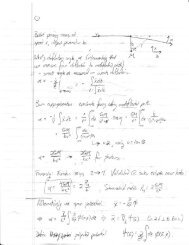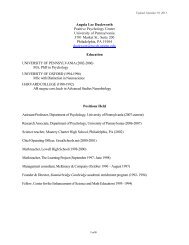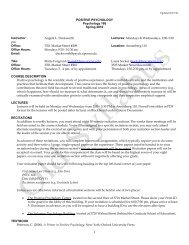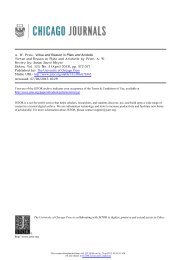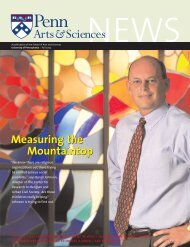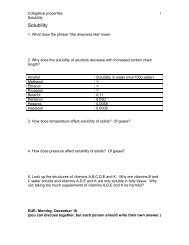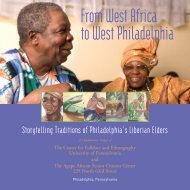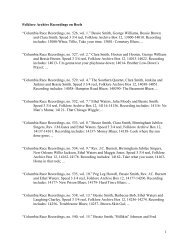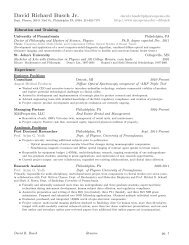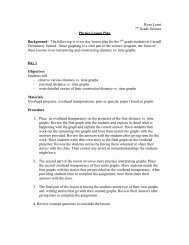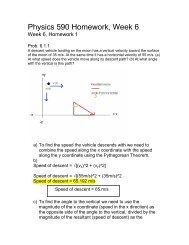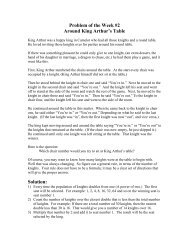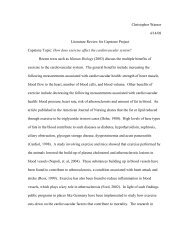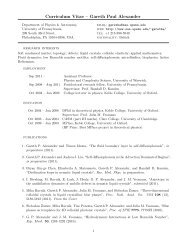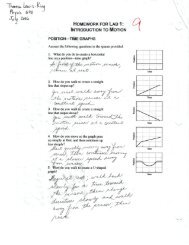PENN SUMMER - University of Pennsylvania
PENN SUMMER - University of Pennsylvania
PENN SUMMER - University of Pennsylvania
Create successful ePaper yourself
Turn your PDF publications into a flip-book with our unique Google optimized e-Paper software.
ClaSSiCal STUDieS<br />
ClsT 200 936 Tr 4:30pm–6:30pm struck<br />
Greek and Roman Mythology<br />
Fulfills Arts & Letters Sector, Cross-Cultural Analysis Course / Crosslisted with:<br />
COML 200 910, FOLK 200 910<br />
Myths are traditional stories that have endured many years. Some <strong>of</strong><br />
them have to do with events <strong>of</strong> great importance, such as the founding<br />
<strong>of</strong> a nation. Others tell the stories <strong>of</strong> great heroes and heroines<br />
and their exploits and courage in the face <strong>of</strong> adversity. Still others<br />
are simple tales about otherwise unremarkable people who get into<br />
trouble or do some great deed. What are we to make <strong>of</strong> all these tales,<br />
and why do people seem to like to hear them? This course will focus<br />
on the myths <strong>of</strong> ancient Greece and Rome, as well as a few contemporary<br />
American ones, as a way <strong>of</strong> exploring the nature <strong>of</strong> myth and<br />
the function it plays for individuals, societies, and nations. We will<br />
also pay some attention to the way the Greeks and Romans themselves<br />
understood their own myths. Are myths subtle codes that contain<br />
some universal truth? Are they a window on the deep recesses <strong>of</strong><br />
a particular culture? Are they entertaining stories that people like to<br />
tell over and over? Are they a set <strong>of</strong> blinders that all <strong>of</strong> us wear, though<br />
we do not realize it? Investigate these questions through a variety <strong>of</strong><br />
topics creation <strong>of</strong> the universe between gods and mortals, religion<br />
and family, sex, love, madness, and death.<br />
MaTheMaTiCS<br />
MaTh 104 936 MTWr 1:00pm–3:10pm rimmer<br />
Calculus, Part I<br />
Fulfills Formal Reasoning Course<br />
Brief review <strong>of</strong> high school calculus, applications <strong>of</strong> integrals, transcendental<br />
functions, methods <strong>of</strong> integration, infinite series, Taylor’s<br />
theorem. Use <strong>of</strong> symbolic manipulation and graphics s<strong>of</strong>tware in<br />
calculus.<br />
MUSiC<br />
MusC 053 936 TBa Muller<br />
African Music<br />
Summer Session ii<br />
JULY 6–AUgUST 13, 2010<br />
enGliSh<br />
engl 104 937 M 5:00pm–8:00pm lotto<br />
Introduction to Romanticism<br />
Fulfills Arts & Letters Sector<br />
This class serves as an introduction to a period <strong>of</strong> study as well as an<br />
introduction to literary study. Our subject will be “Romanticism,” a<br />
famously ill-defined term used as catch-all for the movement, mood,<br />
theory, and revolution that followed the Enlightenment and preceded<br />
the realism <strong>of</strong> the Victorian era. Our course will consider this period<br />
<strong>of</strong> writing—roughly 1789–1830—as one <strong>of</strong> great fluidity and<br />
change, as both a reaction to antiquity and a precursor to modernity.<br />
We will read the works <strong>of</strong> the canonical poets, Blake, Wordsworth,<br />
42 LPS OnLInE COURSES – <strong>SUMMER</strong> SESSIOn II • JULY 6–AUgUST 13, 2010<br />
Coleridge, Shelley, Keats, and Byron, but will fortify our definition<br />
<strong>of</strong> “Romanticism” by addressing the writings <strong>of</strong> Goethe, Mary Shelley,<br />
Charlotte Smith, and Jane Austen.<br />
GerManiC lanGUaGeS<br />
grMn 101 937 MW 6:30pm–8:45pm dixon<br />
Elementary German I<br />
Crosslisted with: GRMN 501 937<br />
As the first course in the first-year series, this course is designed for<br />
the beginning student with no previous knowledge <strong>of</strong> German. As an<br />
online course, this course will focus on the development <strong>of</strong> language<br />
competencies in listening, speaking, reading, and writing through<br />
innovative collaborative instruction and mentoring. Weekly sessions<br />
will combine content from Kontakte, a communicative textbook and<br />
materials designed by the instructor specifically for this interactive<br />
online course. This course <strong>of</strong>fers students flexibility and efficiency<br />
in a demanding academic setting. Part <strong>of</strong> the course work will be<br />
self-paced and will require logging into a custom-designed learning<br />
platform that provides students with opportunities to interact with<br />
the course materials, complete assignments and network with each<br />
other using tools from the social web. The synchronous part <strong>of</strong> the<br />
course will be conducted through the online distance-learning tool<br />
Adobe Connect, through which students will engage in online written<br />
and verbal conversation with each other and with the instructor.<br />
These sessions will be recorded and available at any time for review.<br />
The instructor will be available for online <strong>of</strong>fice hours and individual<br />
interviews with the instructor will complete the online assessment.<br />
hiSTorY<br />
hIsT 020 937 T 6:00pm–7:00pm good<br />
The History <strong>of</strong> the United States, 1607–1877:<br />
Democracy and the American Experiment<br />
Fulfills History & Tradition Sector<br />
This course will chart the history <strong>of</strong> the United States, from its colonial<br />
beginnings in the 17th century to its eventual implosion in the<br />
midst <strong>of</strong> civil war two centuries later. While we will examine the<br />
major turning points in the American past—the formation <strong>of</strong> plantation<br />
slavery, the stirrings <strong>of</strong> colonial revolution, territorial expansion<br />
and the rise <strong>of</strong> industrialization—the course is organized around a<br />
study <strong>of</strong> the promise and the shortcomings <strong>of</strong> American democracy.<br />
We will examine both the meaning and the practice <strong>of</strong> democracy,<br />
using primary documents to better understand how it has changed<br />
over the centuries.<br />
MaTheMaTiCS<br />
MaTh 114 937 MTWr 1:00pm–3:10pm rimmer<br />
Calculus, Part II<br />
Fulfills Formal Reasoning Course / Prerequisite(s): MATH 104<br />
Functions <strong>of</strong> several variables, vector-valued functions, partial derivatives<br />
and applications, double and triple integrals, conic sections,<br />
polar coordinates, vectors and analytic geometry, first and second order<br />
ordinary differential equations. Applications to physical sciences.<br />
Use <strong>of</strong> symbolic manipulation and graphics s<strong>of</strong>tware in calculus.


